- europages
- >
- COMPANIES - SUPPLIERS - SERVICE PROVIDERS
- >
- spherical lenses
Results for
Spherical lenses - Import export

MEETOPTICS LABS, S.L
United States
Transmissive optical components that feature a spherical surface with a constant radius of curvature (R or ROC) across the entire lens, used to diverge or converge light determined by their focal length. Find +10K spherical lenses from verified suppliers at www.meetoptics.com - Plano-Convex Lens - Bi-Convex Lens - Plano-Concave Lens - Bi-Concave Lens - Positive Meniscus Lens - Half Ball Lens From Thorlabs, Edmund Optics, Excelitas, OptoSigma, Boston Electronics, Photonic Solutions, Knight Optical, EKSMA Optics and +100 suppliers. +90K products available.
Request for a quote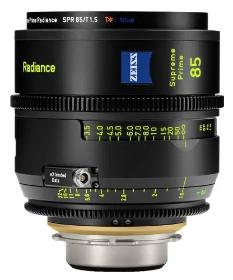
CAMALEÓN CINEMA SERVICES SL
Spain
We offer a wide catalog of optics from the most relevant brands for cinema. Within our catalog you can choose different types of optics: S16mm, 35mm or Full Frame spherical objectives. From the wonderfully smooth look of the Cooke S4 to the sharpness of the Master Primes. Complete sets of fixed optics with extra focal lengths and different zoom options, with servo like the latest Fujinon, lightweight options for using a shoulder-mounted camera like the Angenieux Optimo Style or if what we are looking for is to cover a wide focal range with a good aperture, Angenieux Optimal 24-290. We also have S16 games compatible with Arri Amira and Alexa Mini.
Request for a quote
KNIGHT OPTICAL (UK) LTD
United Kingdom
Knight Optical offer a range of Stock Ball Lenses and Half Ball Lenses, for use within Fibre Lasers. As the name suggests ball lenses are completely spherical lenses mostly made out of High Refractive Index Glass such as Sapphire, and LASFN-9 Glass. The reason ball lenses are most commonly used is for their ability to focus light when leaving a fibre optic, so that it can therefore be used for a laser application. The key feature of ball lenses is their short back focal length allowing for precision coupling where size or space is a limiting factor in the system. Ball lenses are typically used in pairs with one lens acting as a collimator for the second to focus the light back into the coupled fibre. Where a more compact solution is required a half-ball lens is typically more suitable. We hold a large inventory of Ball Lenses. •Stock sizes from 0.5 5mm to 10mm diameter. •Custom sizes available to quotation. •Half Ball lenses also available.
Request for a quote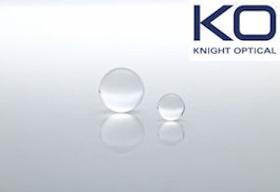
KNIGHT OPTICAL (UK) LTD
United Kingdom
Knight Optical offer a range of Stock Ball Lenses and Half Ball Lenses, for use within Fibre Optics, Signal Coupling and Barcode Scanners. As the name suggests ball lenses are spherical lenses mostly made out of High Refractive Index Glass such as Sapphire, and LASFN-9 Glass. The reason ball lenses are most commonly used is for their ability to couple light in and out of fibres. The key feature of ball lenses is their short back focal length allowing for precision coupling where size or space is a limiting factor in the system. Ball lenses are typically used in pairs with one lens acting as a collimator for the second to focus the light back into the coupled fibre. Where a more compact solution is required a half-ball lens is typically more suitable. We hold a large inventory of Ball Lenses. •Stock sizes from 0.5 5mm to 10mm diameter. •Custom sizes available to quotation. •Half Ball lenses also available. For more information read PDF….
Request for a quote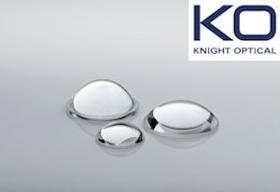
KNIGHT OPTICAL (UK) LTD
United Kingdom
Knight Optical We can offer Custom Moulded Aspheric Lenses for use with Laser Diode Collimators. Aspheric lens surfaces are used to correct spherical aberration (where the converging light from a lens does not have a common focal point, resulting in a distorted image) in lasers and imaging. Traditional spherical lenses cannot collimate light effectively because even small angles of incidence can produce spherical aberrations. This can mean that several components may be required to get the desired result. The non-spherical surface of an aspheric lens allows a single component to effectively focus or collimate even highly divergent emissions, potentially replacing a multi-lens system with a single aspheric lens. Therefore Aspheric Lenses that are moulded are ideal for use within laser diode-to-fibre coupling applications. For more information read PDF ….
Request for a quoteDo you sell or make similar products?
Sign up to europages and have your products listed
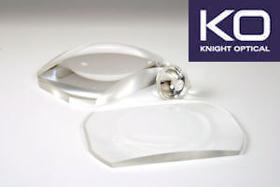
KNIGHT OPTICAL (UK) LTD
United Kingdom
Knight Optical can supply you with custom made Diamond turned aspheric lenses for use within autonomous vehicle LiDAR systems. Autonomous vehicle LiDAR systems create driverless cars. Whereby the system produce autonomous vehicles which can perform complex manoeuvers and drive in public with little or no input from a user. Spherical aberration occurs in common singlet lenses, which results in an image that appears distorted, aspheric lenses correct spherical aberration. An aspheric lens surface is designed non-spherical, which allows a single component lens to collimate or focus highly divergent rays potentially replacing a multi-lens system. This in turn provides the LiDAR system with a better signal quality, at lower costs whilst making the system more compact. Knight Optical offers diamond turned aspherics from a range of suitable NIR materials for autonomous vehicle LiDAR including N-BK7 or equivalent, sapphire, quartz, UV fused silica, amongst others. SEE PDF
Request for a quote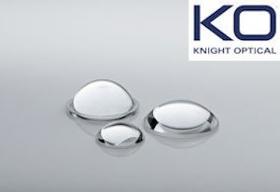
KNIGHT OPTICAL (UK) LTD
United Kingdom
Knight Optical We can offer Custom Moulded Aspheric Lenses for use with Laser Diode Collimators. Aspheric lens surfaces are used to correct spherical aberration (where the converging light from a lens does not have a common focal point, resulting in a distorted image) in lasers and imaging. Traditional spherical lenses cannot collimate light effectively because even small angles of incidence can produce spherical aberrations. This can mean that several components may be required to get the desired result. The non-spherical surface of an aspheric lens allows a single component to effectively focus or collimate even highly divergent emissions, potentially replacing a multi-lens system with a single aspheric lens. Therefore Aspheric Lenses that are moulded are ideal for use within laser diode-to-fibre coupling applications. For more information read the PDF..
Request for a quote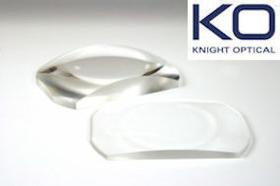
KNIGHT OPTICAL (UK) LTD
United Kingdom
Knight Optical can supply you with a custom made Diamond turned aspheric lenses for use within Thermal Imaging Cameras. We supply a range of diamond turned aspherics for a range of applications. All individually QA checked and metrology tested for quality to ensure parts meet customer specification. Supplied in a range of sizes and shapes with custom coatings tailored to meet your individual applications. Thermal Imaging Cameras work similarly to traditional visible camera systems; while traditional cameras form images using visible light; thermal cameras form images using infrared radiation; operating in wavelengths as long as 14µm. Spherical aberration occurs in common singlet lenses, which results in an image that appears distorted, aspheric lenses correct spherical aberration. An aspheric lens surface is designed non-spherical, which allows a single component lens to collimate or focus highly divergent rays, Read PDF for more information…
Request for a quote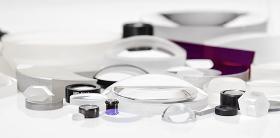
BEFORT WETZLAR OD GMBH
Germany
At Befort, spherical precision optics pass through the hands of qualified specialists. They work with a sure instinct and stateoftheart technology. The machine processing of each surface is done on CNC grinding and polishing machines. We produce spherical precision lenses from optical glass, quartz glass and radiationresistant materials with diameters from 3 mm to 130 mm and a curvature radius from 1.18 mm to plane. We make individual lens elements, achromatic systems, concave mirrors, cylinder lenses and other precisely fitting glass geometries to suit your specific application.
Request for a quoteResults for
Spherical lenses - Import exportNumber of results
10 ProductsCompany type